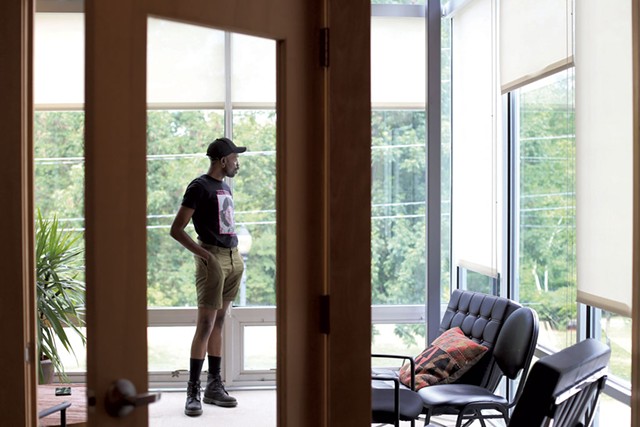
- Sarah Priestap
- Jarvis A. Green at JAG Productions
JAG Productions is a theater company in White River Junction that focuses on works by and about Black people. In early June, founder and producing artistic director Jarvis A. Green released a statement condemning the police killing of George Floyd in Minneapolis. Within eight days, JAG had received more than $10,000 in unsolicited donations.
Over the past few weeks, Green has also received a flood of inquiries from media outlets and cultural institutions seeking comment and artistic collaboration. But in this moment of painful, long-overdue reckoning with systemic racism, Green feels that the assumptions behind many of those requests — that he would lend his voice to predominantly white organizations, that he would use his own pain to educate white people — were misguided.
"My demands are way different than they were before," he said. "I think white cultural institutions that want to engage with Black folk right now should just step out of the way and let the people that are doing the work do it."
In that spirit, Seven Days recorded a conversation between Green and Lillie Harris, a 28-year-old artist from Maryland who just completed their first year at the Center for Cartoon Studies in White River Junction. Harris declined to be photographed for this story.
— Chelsea Edgar
JARVIS GREEN: I have to be honest: Until moving here, I hadn't met any Black cartoonists. So I'm interested in talking about what that actually is like.
LILLIE HARRIS: When I first moved, there was a cartoonist here named Robyn Smith. And I saw her, and she was like, "I was the first Black woman to graduate from CCS." So I'm thinking, When did you come here? Like, 2006? And she was like, "2017 is when I graduated." She told me, "You got it, you're fine, but just know that if you need help..." There might not be a lot of people that look like you in this academy, but there's this culture of Black illustrators and cartoonists and graphic designers looking out for each other.
My hometown is in Prince George's County, a predominantly Black county in Maryland. But, in full disclosure, I think growing up around Black people made me have blinders on — like, I don't understand why it's necessary to have specific Black collectives if, you know, we're always here. But we're not always here. My hometown is an anomaly in America; it doesn't look like that anywhere else.
So, having moved and having seen just how spaced out we all are really does make me appreciate that we do need each other. We need to make sure that we're all getting paid, that everyone is taken care of, because we can't necessarily rely on our environment to do that when our environment isn't always us.
JG: God, I want to visit this town!
LH: Please come! Where are you from?
JG: I'm from Anderson, S.C. There's a Black community, but it's pretty integrated. And in doing theater, I was around a lot of white folk ... How did you find a Black community here?
LH: Well, I found you, and you found me, in the first two or three weeks after I moved here. I was at Piecemeal Pies, and I don't know if I approached you or you approached me, but it basically boiled down to [you saying]: "I've never seen you before, and I know every other Black person here."
JG: A couple weeks ago, we hosted this virtual healing space for Black folk called Come as You Are. Part of that is about refueling — what are ways in which we can express joy, fuel each other, share some light? And I loved what you had to say about Black joy as a form of resistance. What is your practice right now to use your joy as a form of resistance?
LH: I actually practiced that [last week], because I found all these old Crayola chalk pastel things, and I started scribbling and drawing this really cute kid. For me, it's impossible to feel angry or sad while drawing a child. I just want to draw a little being! I just want to draw a kid who's smiling and feeling happy!
I think there's so much pressure on Black artists to draw pain. The only way you can illustrate a story is for it to be a teachable moment, for you to bare your soul and open old wounds so that people see you as a human being. If I want to tell a story detailing struggle or racial issues, I'll do that. But maybe I want to make a story about a couple of werewolves, or people who rent an RV and go on a cross-country trip. It doesn't inherently have to go back to pain. If it bleeds in, it bleeds in; and if it doesn't, it doesn't.
JG: So Seven Days reached out to us and asked whether they could take a photo to accompany this article. When I reached out to you with that request, you were like, "Umm..."
LH: I was thankful that you pulled it out of me.
JG: What was that feeling?
LH: My friend told me once that she is afraid we are National Geographic-ing ourselves at times. And it hit — as if, when there isn't a photo of you to put to your words, people won't listen, the heartstrings won't be pulled. But what you're saying deserves to be heard, regardless of whether there is a photo attached. You don't need to see someone on the brink to know that what they're saying is impactful.
JG: In my field, it's always been about how many people are engaging with your work and how you're visible. Especially going into [JAG Productions'] fifth year, I want people to see it, and it is deserving of attention. But in this moment, I don't have a filter. If I'm going to be in conversation about things that are really difficult, there's no moderate Jarvis.
I've been getting so many responses from cultural institutions and media outlets asking about how we're responding to this, how we feel. Seven Days reached out with some questions. I declined the interview. And then we got to this point where I was like, "One, I want to know what work is being done in this newspaper right now to be anti-racist. What are the practices, what are the values, how are you working on dismantling white supremacy within your own organization? And two, how can you amplify Black and BIPOC voices in the state of Vermont before we get to a collaboration?"
So then [Seven Days said], "Instead of us interviewing you, how about you interview someone you admire and whose voice you want to amplify?" And I was like, "I have a perfect person."
LH: How do you honor emotions that aren't seen as positive or inspirational for other people — the anger that you feel with all these things happening?
JG: I say it. I have a board that is actively doing the work — a combination of Black folk, white folk, Indian folk, Latinx folks. The cochair and the treasurer are white, and I'm very quick to remind them of moments when that whiteness—
LH: It'll jump out.
JG: It will jump out! And particularly with my cochair, I get to express that anger, that part of me. I just do it. And I have really good therapy. And my family down South — we're on a family [text] thread, so I talk to them quite a bit. What about you?
LH: I do "vent art." I do a lot of sweeping motions, just to get it out. More consistently, it's been talking with friends back home. And knowing when to stay away from conversations when I know I'm being petty.
JG: Ooh! You're giving me another nugget!
LH: Because I know myself well enough to say, "Lillie, is this founded, or is this you wanting it out, because you're mad about something else?"
JG: [Stomps his foot.] I've been guilty of that this week.
LH: I feel like, as a Black person, there is this weight on you to be the one to educate, to shelter people along, to help them understand the strife you're going through. So it's having compassion while also realizing that I'm not obligated to do this — and not feeling obligated does not mean that I don't want my people to succeed.
It just means that I cannot dedicate my life to making sure that one person gets it. And then you feel guilty at times, because you're like, "I didn't use my voice to make sure that person No. 533 can understand!"
There are books! There are books from scholars, people who have studied this. Why me? I know about my very specific interests, and I have lived experience, but I am not an "academic Black person." Angela Davis can help you out.
JG: I run into that, too, with donors and philanthropy. Eighty percent of our funding is from white folks. They're contributing to the success of the organization, but it's the balance of how much I'm going to allow some of these painful conversations to happen, waiting for this hour to end and that check to be written. How much do I keep my mouth shut in response to the craziness that comes out?
LH: It's rough. Literally, a lifetime of picking battles is what it is.
JG: That's right. I don't do this work for white folk. Yes, white people benefit from the storytelling, and they donate, but when I do this, I'm not thinking about how I'm going to educate white people. I'm thinking about what opportunity can be created for Black folk.
How can we break down these Western forms of theater? How can I liberate myself from these old forms, and how can we create more joy? The rage and animosity that we carry in us — what does that do to our insides? Right now, I'm focused on finding my joy, because that's what's going to sustain me.

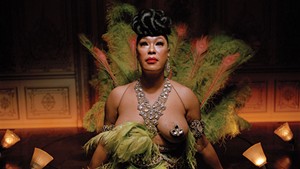
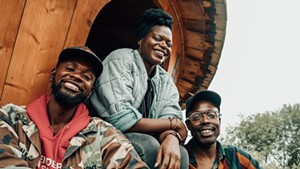
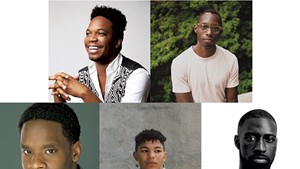
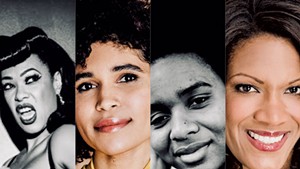
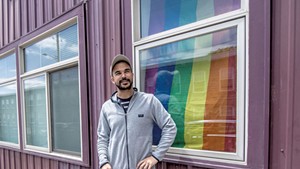








Comments
Comments are closed.
From 2014-2020, Seven Days allowed readers to comment on all stories posted on our website. While we've appreciated the suggestions and insights, right now Seven Days is prioritizing our core mission — producing high-quality, responsible local journalism — over moderating online debates between readers.
To criticize, correct or praise our reporting, please send us a letter to the editor or send us a tip. We’ll check it out and report the results.
Online comments may return when we have better tech tools for managing them. Thanks for reading.